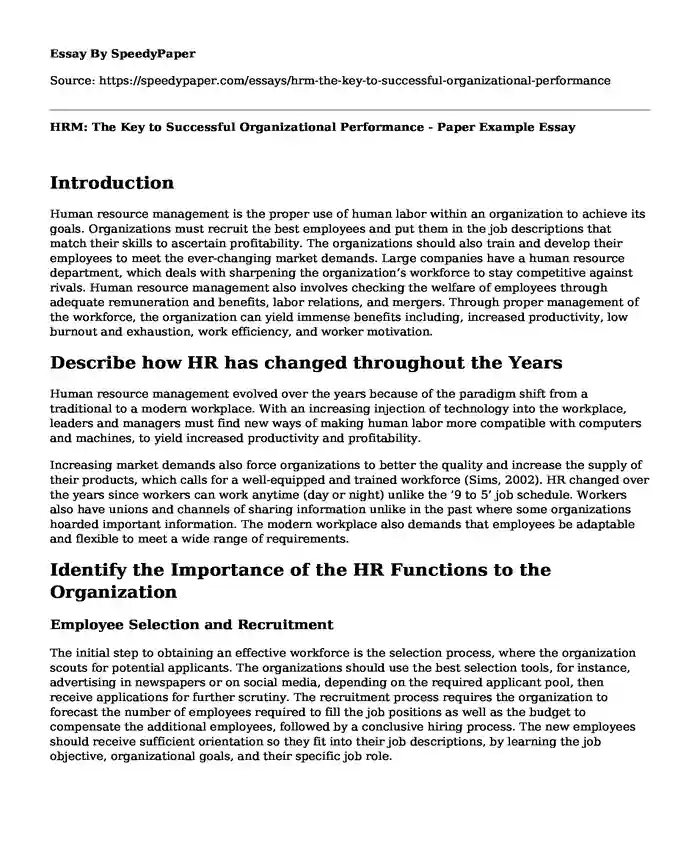
| Type of paper: | Essay |
| Categories: | Company Management Business |
| Pages: | 3 |
| Wordcount: | 645 words |
Introduction
Human resource management is the proper use of human labor within an organization to achieve its goals. Organizations must recruit the best employees and put them in the job descriptions that match their skills to ascertain profitability. The organizations should also train and develop their employees to meet the ever-changing market demands. Large companies have a human resource department, which deals with sharpening the organization’s workforce to stay competitive against rivals. Human resource management also involves checking the welfare of employees through adequate remuneration and benefits, labor relations, and mergers. Through proper management of the workforce, the organization can yield immense benefits including, increased productivity, low burnout and exhaustion, work efficiency, and worker motivation.
Describe how HR has changed throughout the Years
Human resource management evolved over the years because of the paradigm shift from a traditional to a modern workplace. With an increasing injection of technology into the workplace, leaders and managers must find new ways of making human labor more compatible with computers and machines, to yield increased productivity and profitability.
Increasing market demands also force organizations to better the quality and increase the supply of their products, which calls for a well-equipped and trained workforce (Sims, 2002). HR changed over the years since workers can work anytime (day or night) unlike the ‘9 to 5’ job schedule. Workers also have unions and channels of sharing information unlike in the past where some organizations hoarded important information. The modern workplace also demands that employees be adaptable and flexible to meet a wide range of requirements.
Identify the Importance of the HR Functions to the Organization
Employee Selection and Recruitment
The initial step to obtaining an effective workforce is the selection process, where the organization scouts for potential applicants. The organizations should use the best selection tools, for instance, advertising in newspapers or on social media, depending on the required applicant pool, then receive applications for further scrutiny. The recruitment process requires the organization to forecast the number of employees required to fill the job positions as well as the budget to compensate the additional employees, followed by a conclusive hiring process. The new employees should receive sufficient orientation so they fit into their job descriptions, by learning the job objective, organizational goals, and their specific job role.
Upholding Working Conditions and Employee Relations
Niedhammer et al. (2018) confirms workplace injury as a burden both to the organization and to the society since it affects the worker and their families. Reducing workplace accidents and improving the safety of workers requires adequate prevention policies aimed at both work injury and health-related outcomes. Unmotivated employees do not contribute their full potential toward organizational goals unlike their counterparts motivated by adequate working conditions. Hagedorn et al (2016) also confirm that labor unions are essential to upholding working conditions that conserve the environment, community interests, and the overall health of workers.
Training and Development
Training and development are imperative for both the current and future needs of the organization. Training and development equip the workforce with the necessary skills and knowledge to fulfill the job roles that might change depending on the direction of the organization or the demands of the consumer. This process helps the already-qualified employees gain additional skills relevant to meeting their job descriptions. Development of the workforce also requires receiving information from other organizations on the changing landscape of business operations and enabling the workers to deliver exactly what the consumer needs.
References
Hagedorn, J., Paras, C. A., Greenwich, H., & Hagopian, A. (2016). The Role of Labor Unions in Creating Working Conditions That Promote Public Health. American journal of public health, 106(6), 989–995. https://doi.org/10.2105/AJPH.2016.303138
Niedhammer, I., Lesuffleur, T., Labarthe, G., & Chastang, J. F. (2018). Role of working conditions in the explanation of occupational inequalities in work injury: findings from the national French SUMER survey. BMC public health, 18(1), 344.
Cite this page
HRM: The Key to Successful Organizational Performance - Paper Example. (2023, Nov 29). Retrieved from https://speedypaper.com/essays/hrm-the-key-to-successful-organizational-performance
Request Removal
If you are the original author of this essay and no longer wish to have it published on the SpeedyPaper website, please click below to request its removal:
- Essay Sample on Role of Risk Assessment
- Free Essay on Role of Distribution in the Supply Chain
- Essay Sample on Factors That Affect Consumer Purchasing Behaviour in the UK Retail Industry
- Market Structure of Amazon - Essay Example
- PMI-ACP Certification - Essay Example
- Role of Operations Manager in Organizational Success - Essay Sample
- Free Paper Example on Cost-Reduction Methods at Amazon
Popular categories




